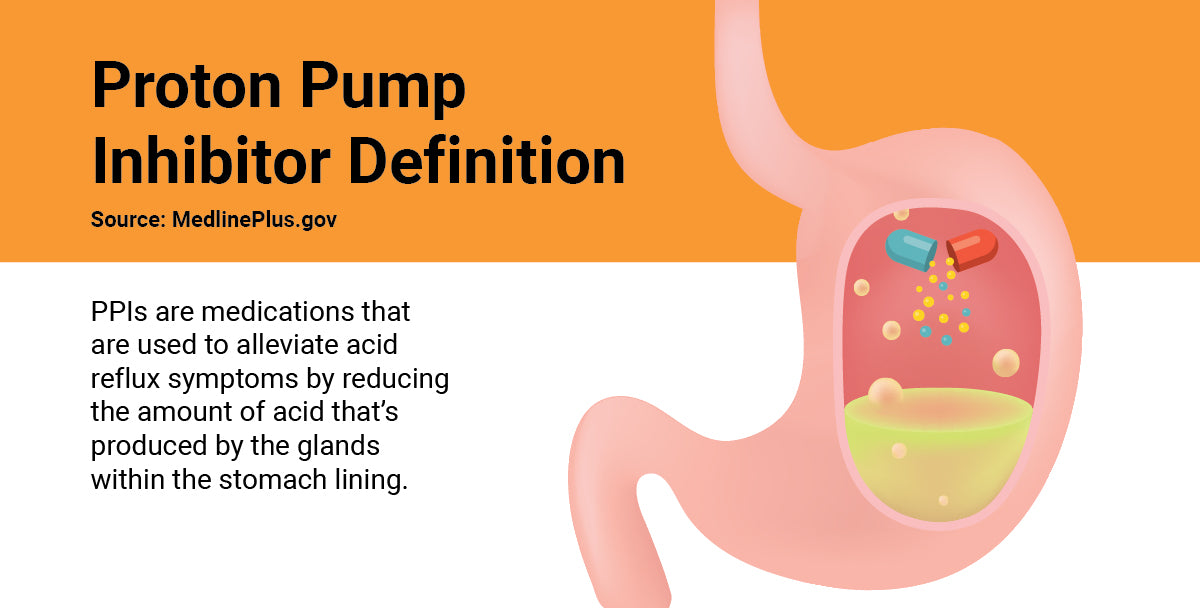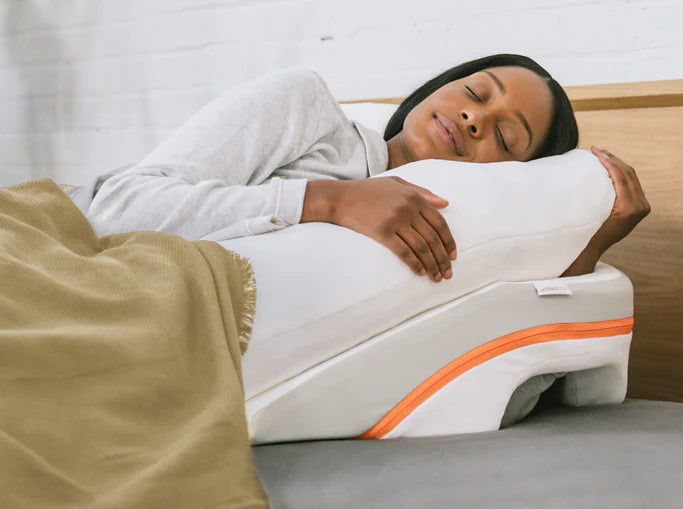Your Cart is Empty

YOUR CART
Your cart is empty!
Add your favorite items to your cart.

Proton Pump Inhibitor Side Effects
February 19, 2015 5 min read
Medications for GERD, including Prilosec (omeprazole), Dexilant, and Nexium are available through your doctor or over-the-counter at your local pharmacy. Proton Pump Inhibitors (PPIs), also known as the “purple pill”, are commonly used to decrease painful heartburn symptoms that affect up to 15 million Americans1 each day. Like any other prescribed or over-the-counter medication, PPIs come with their own unique advantages and side effects that may influence how you decide to approach acid reflux treatment.
In this post, we’ll explain what PPIs are (and what they aren’t), discuss side effects, explore the question, “are PPIs safe?”, and discuss alternative acid reflux treatment options. Use the links below to jump ahead to the section that best answers your query, or read through for a complete overview on the topic:
- What Are PPIs?
- How PPIs Work
- What do PPIs treat?
- Types of PPIs
- Common Side Effects of PPIs
- Extreme Side Effects of PPIs
- FDA warns against long-term PPI usage
- Are There Alternative Treatments to PPI?
What Are PPIs?
Proton Pump Inhibitor Definition:PPIs2 are medications that are used to alleviate acid reflux symptoms by reducing the amount of acid that’s produced by the glands within the stomach lining.
Available since the 1980’s, proton pump inhibitors (PPIs) are widely prescribed. They were thought to be the ‘silver bullet’ for treating the symptoms of gastroesophageal reflux disease (GERD) because they stop the production of stomach acid. No acid, no reflux. Problem solved.
However, the long-term side effects of PPIs may not be worth the temporary elimination of stomach acid.

How PPIs Work
Rather than reacting to acid reflux symptoms, PPIs aim to stop stomach acid right in its tracks. When taken just before a meal, PPIs3 prevent cells in the stomach from producing and “pumping” out stomach acid that causes some individuals to experience heartburn and related symptoms.
What do PPIs treat?
Proton pump inhibitors are used to treat the following conditions:
- Acid reflux
- Gastroesophageal reflux disease (GERD)
- Duodenal or stomach (gastric) ulcers
- Damage to the lower esophagus as a result of acid reflux
- Pill-induced esophagitis (a condition that can occur when a pill is stuck in your throat)
Types of PPIs
There are several different types and brands of PPIs, including:
- Omeprazole (Prilosec), also available over-the-counter (without a prescription)
- Esomeprazole (Nexium), also available over-the-counter (without a prescription)
- Lansoprazole (Prevacid), also available over-the-counter (without a prescription)
- Rabeprazole (AcipHex)
- Pantoprazole (Protonix)
- Dexlansoprazole (Dexilant)
- Zegerid (omeprazole with sodium bicarbonate), also available over-the-counter (without a prescription)
Common Side Effects of PPIs
Like any other medication, PPI side effects vary categorically as well as in severity. Some of the more common, less extreme side effects2 associated with PPIs include:
- Headache
- Diarrhea
- Constipation
- Nausea
- Itching
Extreme Side Effects of PPIs
While less common, it’s important to be aware of the more extreme side effects of PPIs if you’re currently using them or are considering proton pumping inhibitors as a treatment for your reflux symptoms.
According to U.S. Pharmacist4, some of the more severe side effects are:
- Kidney disease
- Fractures
- Infections
- Vitamin deficiencies (specifically Iron and Vitamin B12)
Most of these extreme reactions are associated with long-term PPI side effects, which we’ll discuss in more detail below.
When should you consult your doctor?
The U.S. National Library of Medicine says patients who are experiencing PPI side effects should contact their provider if:
- You are having side effects from these medicines
- You are having other unusual symptoms
- Your symptoms are not improving
FDA warns against long-term PPI usage
After pondering “are PPIs safe?” you decide you’ll give PPI treatment a go. Fast forward 40 years. As we can see with the aforementioned side effects, we are now learning that stopping the production of stomach acid with long-term PPI usage may come with significant risks3 for patients.

Harvard Medical School3 breaks down some of the most severe risks that PPIs present to acid reflux patients:
- Fracture risk: Low stomach acid could translate to lower levels of calcium being absorbed, which could weaken bones, and therefore, present a higher risk of bone fractures.
- Pneumonia risk: Stomach acid plays a role in killing bacteria, but when PPIs reduce the production of acid, the environment becomes more appealing to bacteria and puts users at greater risk for contracting illnesses such as pneumonia.
- C. difficile risk: Some studies have shown a connection between C. difficile infections after PPIs disrupted the natural bacteria and environment within the large intestine.
- Iron and B12 deficiency: PPIs transform iron and B-12 from food into byproducts that are more easily absorbed and less irritating to the stomach, but, in turn, may lead to vitamin deficiencies.
Several FDA warnings have been issued and hundreds of studies published showing an association between long term PPI usage with hip, wrist or spine fractures; bacterial infections; chronic kidney disease; heart disease; dementia; community-acquired pneumonia; stomach cancer; chronic liver disease; and even premature death.
In fact, if you look at the dosing instructions for the most common PPI medications, you will see that the instructions are clear. Only use these medications 3x a year for no more than 14 days. That’s it. Have you been taking your PPI medications for longer than recommended by the FDA? You might consider adjusting your treatment plan, or better yet, consider what alternative treatments are available to you.

Are There Alternative Treatments to PPI?
In light of serious medication side effects, patients nationwide are seeking alternative solutions to treat their symptoms. Over 100,000 of which have found great relief at night with the MedCline Reflux Relief System.
This sleep positioning medical device creates (and maintains) the ideal position for patients at night to naturally relieve their GERD symptoms, including:
- Heartburn
- Regurgitation
- Lesser-known symptoms of ‘silent reflux’, such as chronic cough, and nasal congestion.
Clinical studies have shown that MedCline acid reflux pillow reduces esophageal acid exposure (acid that escapes your stomach into the delicate lining of your esophagus and beyond) by 87% over a bed wedge. Decreasing acid exposure will not only decrease your symptoms but will also provide protection against disease progression and the dangers of GERD.
Why is MedCline so effective? Gravity and anatomy. By keeping your esophagus above your stomach, acid cannot escape. And, by keeping you in this position, you won’t slide down exposing yourself the risk of acid exposure. Simple science in action, all while you sleep.
Say goodbye to nighttime Acid Reflux & GERD pain without sacrificing comfort.Related Product
Reflux Relief System
$249.99 BUY NOW
Want to learn more about how the MedCline Reflux Relief System can help address your reflux symptoms? Get in touch with our Sleep Specialists:
- By phone: 800-610-1607
- By email: support@medcline.com, Anytime
- Chat with a Sleep Specialist,
References
- American College of Gastroenterology, “Acid Reflux”, https://gi.org/topics/acid-reflux/#:~:text=More%20than%2060%20million%20Americans,experience%20heartburn%20symptoms%20each%20day.,31 Jul. 2020
- U.S. National Library of Medicine, “Proton Pump Inhibitors,”https://medlineplus.gov/ency/patientinstructions/000381.htm, 31 Jul. 2020
- Harvard Medical School, “What you should know about: PPIs”, https://www.health.harvard.edu/diseases-and-conditions/what-you-should-know-about-ppis#:~:text=PPIs%20work%20by%20inhibiting%20certain,over%20a%20period%20of%20time., 31 Jul. 2020
- U.S. Pharmacist, “Proton Pump Inhibitors: Considerations With Long-Term Use”, https://www.uspharmacist.com/article/proton-pump-inhibitors-considerations-with-longterm-use#:~:text=The%20most%20common%20side%20effects,for%20more%20than%20a%20year).,31 Jul. 2020
In light of serious medication side effects, patients nationwide are seeking alternative solutions to treat their symptoms. Over 100,000 of which have found great relief at night with the MedCline Reflux Relief System. This sleep positioning medical device creates (and maintains) the ideal position for patients at night to naturally relieve their GERD symptoms, including heartburn, regurgitation, and lesser-known symptoms of ‘silent reflux’, such as chronic cough, and nasal congestion. Clinical studies have shown that MedCline reduces esophageal acid exposure (acid that escapes your stomach into the delicate lining of your esophagus and beyond) by 87% over a bed wedge. Decreasing acid exposure will not only decrease your symptoms but will also provide protection against disease progression and the dangers of GERD. Why is MedCline so effective? Gravity and anatomy. By keeping your esophagus above your stomach, acid cannot escape. And, by keeping you in this position, you won’t slide down exposing yourself the risk of acid exposure. Simple science in action, all while you sleep.
Related Product
Reflux Relief System
$249.99
Say goodbye to nighttime Acid Reflux & GERD pain without sacrificing comfort.
Subscribe
Sign up to get the latest on sales, new releases and more …
Text SHOULDER to+1 (844) 942-0170to learn more and get discounts on our Shoulder Pain Relief System.
About MedCline
MedCline was founded in 2011 by Carl Melcher, M.D, who was a life-long sufferer of GERD. Dr. Melcher wanted to help the millions of GERD patients with a natural treatment alternative utilizing positional therapy. Since development, the Reflux Relief System has been validated in 7 clinical trials. Aiming to help other medical conditions with positional therapy, MedCline has also developed a Shoulder Relief System for those who suffer with chronic shoulder pain at night. Both MedCline Relief Systems are providing much-needed relief for those suffering from nocturnal acid reflux and/or nighttime shoulder pain to get quality, restorative sleep leading to a higher health-related quality of life.
To learn more about acid reflux relief, visit our Reflux Relief System Page.
To learn more about shoulder pain relief, visit our Shoulder Relief System Page.

